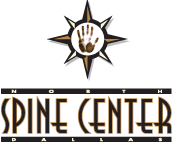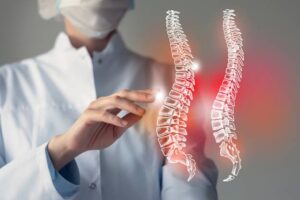
Introduction
Degenerative disc disease (DDD) is a common condition that can cause persistent back and neck pain, significantly impacting an individual’s quality of life.
This condition results from age-related wear and tear on the spinal discs, leading to pain, stiffness, and limited versatility. For those seeking effective and non-invasive treatments for degenerative disc disease in Dallas, North Dallas Spine Center offers extend of non- surgical alternatives designed to alleviate pain and promote long-term spinal health.
This blog will explore what degenerative disc disease is, the symptoms and causes, and the non-surgical treatment options available to manage this condition effectively.
Understanding Degenerative Disc Disease
Degenerative disc disease is a condition where the intervertebral discs, which act as shock absorbers between the vertebrae, start to deteriorate. These discs naturally lose water content over time, which decreases their flexibility and cushioning ability. As a result, the disc’s ability to absorb impact is reduced, potentially causing pain and other related symptoms.
What Causes Degenerative Disc Disease?
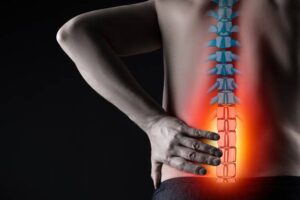
Several factors contribute to the development of DDD, including:
- Aging: The most common cause of DDD is the natural aging process, which leads to changes in the composition of the spinal discs.
- Wear and Tear: Repeated daily activities and minor injuries can accumulate over the years, contributing to disc degeneration.
- Genetic Predisposition: Some individuals may have a genetic tendency that makes them more prone to developing DDD.
- Trauma or Injury: A sudden injury or trauma to the spine can accelerate disc degeneration.
Symptoms of Degenerative Disc Disease
The symptoms of DDD can vary based on the location and severity of the disc degeneration. Common symptoms include:
- Chronic Pain: Pain in the neck or lower back that may radiate to other areas, such as the arms or legs.
- Neck Pain: Individuals with disc degeneration in the cervical spine may experience neck pain, particularly if the affected disc compresses nearby nerves.
- Stiffness: Limited range of motion and stiffness, especially after prolonged periods of inactivity.
- Numbness or Tingling: These sensations may occur if the degenerated disc compresses nearby nerves.
- Pain Flare-Ups: Periods of intense pain that may last from a few days to weeks.
Understanding these symptoms can help guide individuals in seeking appropriate treatment from a qualified spine doctor in Plano.
Non-Surgical Treatment Options for Degenerative Disc Disease
At North Dallas Spine Center, we prioritize non-surgical, evidence-based treatments that provide relief and promote healing without invasive procedures. Here are some of the effective non-surgical treatment options for degenerative disc disease in Dallas:
- Spinal Decompression Therapy
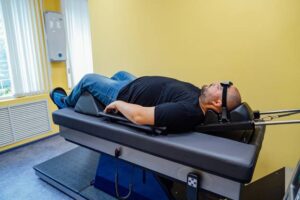
Spinal decompression therapy is a non-invasive technique that gently stretches the spine to relieve pressure on the affected discs. This therapy helps create negative pressure within the disc, which can encourage rehydration and nutrient flow, promoting healing and reducing pain.
Benefits of Spinal Decompression Therapy:
- Reduces disc pressure and promotes healing
- Provides pain relief without surgery
- Improves disc health and function
- NUCCA Chiropractic Care
The NUCCA chiropractic technique is a specialized, gentle adjustment method that targets misalignments in the upper cervical spine. While primarily focused on the upper spine, correcting alignment can positively impact the entire spinal column. This realignment can alleviate pressure and tension on the spine, reducing pain associated with DDD.
How NUCCA Helps:
- Restores proper spinal alignment
- Reduces nerve compression
- Supports the body’s natural healing process
- Class IV Laser Therapy
Class IV laser therapy is a cutting-edge, non-invasive treatment that uses concentrated light energy to penetrate deep into tissues. This therapy reduces inflammation, promotes blood circulation, and accelerates tissue repair, providing relief from chronic pain associated with DDD.
Benefits of Class IV Laser Therapy:
- Decreases inflammation and pain
- Promotes faster healing
- Painless and effective treatment sessions
Benefits of Non-Surgical Treatments for DDD

Opting for non-surgical treatments for degenerative disc disease offers several advantages:
- Reduced Risk and Recovery Time
Non-surgical treatments eliminate the risks associated with surgery, such as complications from anesthesia and prolonged recovery periods. Patients can experience significant pain relief and improved functionality without the downtime that surgery entails.
- Natural Healing and Pain Relief
Many non-surgical treatments, such as spinal decompression therapy and NUCCA adjustments, work with the body’s natural healing processes. These treatments aim to reduce pain and inflammation while supporting long-term spinal health.
- Personalized Care Plans
Non-surgical treatments can be tailored to meet each patient’s specific needs and condition. At North Dallas Spine Center, we develop personalized treatment plans to ensure optimal outcomes for each individual.
What to Expect During Treatment
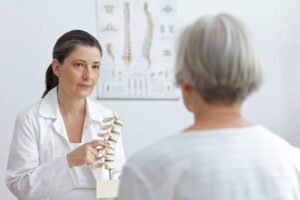
Understanding what to expect can help set realistic expectations for treatment outcomes. At North Dallas Spine Center, the patient journey typically includes:
Initial Consultation and Assessment
A comprehensive consultation and assessment are conducted to evaluate the patient’s medical history, symptoms, and diagnostic imaging. This initial step is crucial to creating a customized treatment plan.
Treatment Sessions
Whether undergoing spinal decompression therapy or NUCCA chiropractic adjustments, treatment sessions are designed to be comfortable and effective. Spinal decompression sessions typically last 30 to 45 minutes and may be scheduled several times per week for a few weeks.
Follow-Up and Monitoring
Regular follow-up appointments allow for monitoring progress and making any necessary adjustments to the treatment plan. This ongoing assessment ensures the therapy is effective and supports long-term recovery.
Supporting Your Recovery
To maximize the benefits of non-surgical treatments, patients can adopt lifestyle changes and practices that support spinal health:
- Maintain Proper Posture: Good posture reduces strain on the spine and helps maintain alignment.
- Stay Active: Engage in low-impact activities like swimming or walking to maintain flexibility and strength.
- Hydration and Nutrition: Keeping the body well-hydrated and nourished supports disc health and overall recovery.
- Mindful Movement: Avoid sudden, strenuous movements that can exacerbate spinal conditions.
Final Thoughts
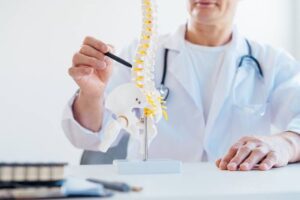
Living with degenerative disc disease can be challenging, but non-surgical treatments at North Dallas Spine Center offer effective solutions for managing pain and promoting spinal health. From advanced spinal decompression therapy to the precision of NUCCA chiropractic care, patients have access to comprehensive, personalized treatment plans that support long-term wellness. If you’re seeking non-invasive treatment options for neck pain in Dallas or broader spinal health in Plano, consider scheduling a consultation to explore how these therapies can help you regain comfort and mobility.
For more information on non-surgical treatments for degenerative disc disease, visit North Dallas Spine Center and take the first step toward relief and improved quality of life.
Citations
